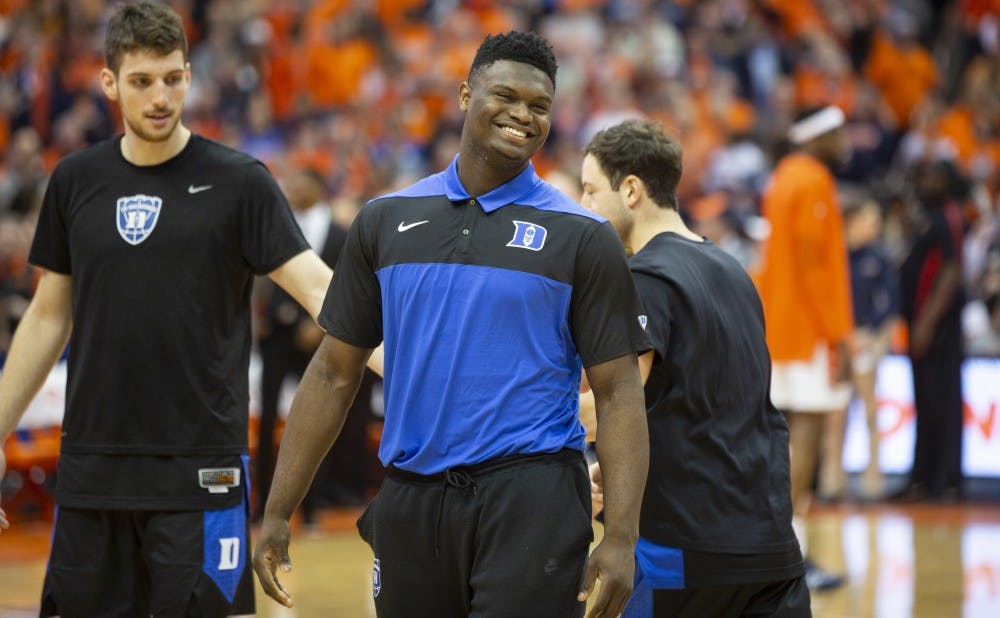Dear Mr. Williamson,
A week or so ago, Duke fans across the nation sat down to watch our team, and you in particular, beat the Tar out of the Heels. Sadly for all involved, you went down with an injury within the first minute of the game when your shoe literally split in half. After an awful night, one filled with losses and disappointments, I still have hope that this whole ordeal could end on a positive note. But it all starts with one, big step: please never play basketball in a Duke jersey again.
I don’t ask you to stop playing for Duke basketball because I think you make the team worse, that would be ridiculous—you are one of the best college basketball players in recent memory. I don’t ask you to stop playing for Duke basketball because you fail to be entertaining; you’ve produced highlight worthy clips since you were in high school and your incredible dunks have continued in Cameron. I am asking you to stop playing basketball at Duke because you and your fellow college basketball players are being exploited.
The NCAA (National College Athletics Association) is an unjust racket. It is the only organization in the country that pays its labor force (college basketball players) nothing, pockets all of the profits (which are considerable, over $1.1 billion in 2017), and largely escapes public outcry despite such abnormal, predatory practices. This situation persists despite the fact that, according to a study by Drexel University, if college basketball players received a percentage of league revenue equivalent to their professional counterparts the average player would command north of $260,000 annually. Even if you subtract the absurdly expensive annual costs of attending Duke, $73,513 as of this year, Duke basketball players are not getting paid close to their true worth. Furthermore, the typical college athlete cannot comfortably shrug this injustice off. In fact, for many college athletes, basketball players included, the reality is quite dire: over 86 percent of college athletes live in poverty. Adding to this, a significant number of college athletes come from poor families, who would surely benefit from an extra source of income.
“Yeah but most of these players go on to the NBA! In a few years they’ll all be millionaires, right?” Wrong. Yes, some college basketball players will play professionally and make millions from their salary and endorsements. But most will not. Most men’s college basketball players, 98.8 percent according to the NCAA, will never play professionally. So it’s fairly safe to say that for the Jordan Goldwires, the Mike Buckmires, and the Alex O’Connells of the world—this could be it. Their few years at Duke will likely be the only time they are ever economically productive as basketball players. And yet they are categorically denied the right to make any money whatsoever during the limited time when they potentially could! Jordan Goldwire cannot sign shoe deals. Mike Buckmire cannot charge money for his autographs. Alex O’Connell cannot issue endorsements. I can do all of those things. Why do I have rights and privileges that my fellow students, who happen to be basketball players, do not? If that does not sound convenient to you, then I assure you it sounds convenient to the NCAA.
The NCAA defends itself by arguing that these players are amateurs and that, regardless of that, they are compensated by virtue of their tuition being free. First, as I have already pointed out, even the cost of a Duke education is still an underpayment relative to their true value. Secondly, the “amateur” argument is absurd on its face. In what sense are Division I basketball players amateurs? Maybe college basketball players are amateurs when compared to LeBron James or Kevin Durant. But when compared to the vast majority of the world’s population it becomes clear that college basketball players are not amateurs at all—they are some of the most phenomenally gifted and skilled people in the world! Given that that is true, these athletes should be compensated as such. Forget about March, the real madness is the way the NCAA treats its players.
So Zion, please don’t come back. Instead, bring attention to this issue and use your platform as one of American basketball’s latest and greatest stars to advocate for your underprivileged peers. As we all know, you get compared to LeBron on a daily basis. Like many, I believe you can be the next LeBron. But part of what makes LeBron a superstar is not just his play on the court, but the content of his character and his status as a social advocate for the less fortunate. Thousands of your fellow basketball players live in poverty, are denied the same rights and privileges as other students, and cannot capitalize on the one chance they will likely ever have to make money playing basketball. In ancient Hebrew, Zion roughly means “promised land.” Hopefully, you are the “promised man” who will help right the wrongs of the NCAA.
Sincerely,
Reiss Becker
Reiss Becker is a Trinity sophomore. His column usually runs on alternate Mondays.
Get The Chronicle straight to your inbox
Signup for our weekly newsletter. Cancel at any time.

